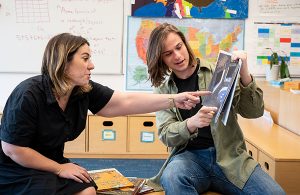Early Childhood Master’s Degree Programs
Find Your Early Childhood Education Specialization
With an early childhood masters degree from Bank Street, you’ll learn how to help children from birth to second grade build a healthy foundation for social, emotional, and cognitive growth that will serve them for the rest of their lives.
Choosing Bank Street
 At Bank Street, we believe that supporting the curiosity and individuality of young children begins with engaging the same traits in educators like you. In our Early Childhood programs, you’ll:
At Bank Street, we believe that supporting the curiosity and individuality of young children begins with engaging the same traits in educators like you. In our Early Childhood programs, you’ll:
- Become well-grounded in child development, focusing on social, emotional, and intellectual growth of babies and children.
- Gain the specialized skills and dispositions needed to work with young learners while developing an understanding that learning comes in the form of play, social interaction, and sensory experiences, as well as through engagement in literacy, literature, math, science, arts, and social studies.
- Experience coursework and fieldwork rich in inquiry, with many opportunities, including faculty-led conference groups for you and your peers to reflect on your own experiences and growth as educators.
You’ll also learn to support and advocate for children and families with various racial, linguistic, and cultural backgrounds, as well as for children with a range of developmental variations. Our social justice-oriented practice will guide you toward a deeper understanding of the forces impacting children’s lives in an interdependent and ever-changing world.
If you’re ready to take a transformative step in your career, consider an early childhood education master’s degree from Bank Street. Join our collaborative and supportive educational community today.







